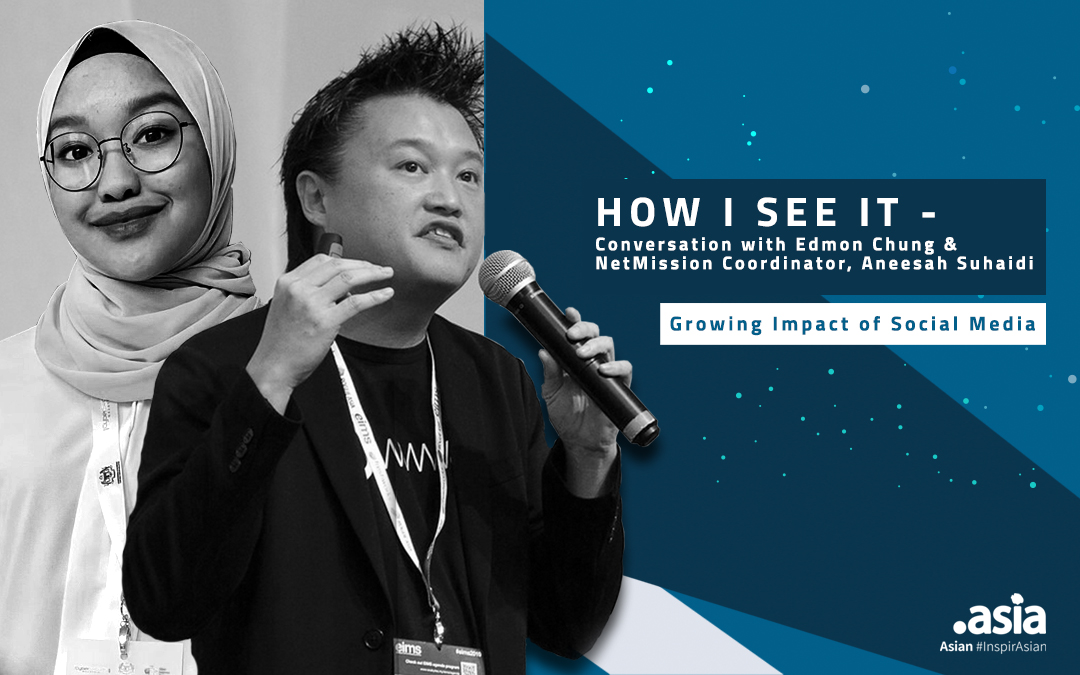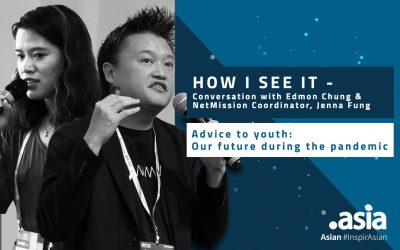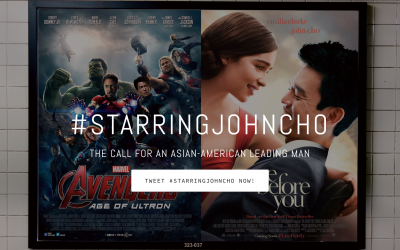Billions of people connect to the Internet for solely to connect be on social media nowadays. In many aspects, social media has become one of the most important tools to keep us engaged and connected, especially during COVID.
Not only is it a platform for users to seek entertainment and network with their friends and family, but it’s also a powerful tool that influences one’s personal development, political views and public safety.
In this episode, Edmon Chung, CEO of DotAsia Organisation, and NetMission ambassador, Aneesah Suhaidi — a 19 year-old law student from Malaysia and a passionate activist in Internet policy — to explore how social media influences daily life of young people.
“I believe our world changes through metamorphosis, gradually and in stages. Social movements also goes through transformational process, meaning that social idea starts off with just an amalgamation of people and ideas (online and offline) before going mainstream.”

Aneesah:
How does social media play apart in your daily life?
The younger generation is more dependent on social media today, which aspect of youth personal development do you think is most affected by this online world?

Edmon:
Growing up in the age of social media can be challenging. Young people today are confronted with an overabundance of information. In a way this is good, because it challenges them to sharpen their thinking and cut through the clutter. As an older person I don’t think I would fare as well in this overwhelming information age.
I see today’s youth developing more mental resilience, an imperative quality and character that allows them to filter information and suspend judgement. I think these are skills that should be mastered by younger generations to handle criticism on social media, process overwhelming information or perform under pressure.
I am optimistic and hopeful that the generations that follow will become more resilient and mentally stronger than people in my cohort.

Aneesah:
What do you think about the “challenge” initiated by some influencers online or some behaviors of these users?
Most of these challenges are going viral regardless if it’s bringing positive influence to our society. For example, licking the toilet to prove COVID-19 is really not a thing, stabbing the neighbors to get famous, accidentally falling off the building because they were attempting to get a nice photo. How should we “educate” the younger generation to behave responsibly?

Edmon:
As a father, I hope my children develops the ability to make good decisions, take decisive action, and have courage to live up to consequences. In practice, to put it simply, think before you act. There are two things to address:
One, we all know by now, once a video or picture is uploaded it will forever be there. The rest of the Internet, can store, keep and/or archive it. In the past, when people do something silly, they do not get moralised for eternity, their action may likely be forgotten.
Two, I hope our society progresses to show more forbearance, and compassion toward each other so that we may look beyond a clip or picture from once-upon-a-time and pass judgement on a person today. That is the optimistic side of me toward the future.

Aneesah:
What will happen when big enterprises like Microsoft or Oracle buy a social media app that is so popular everywhere all over the world?
Recently, the U.S. banned some Chinese social media apps like WeChat and TikTok, which triggered Microsoft to bid on buying the TikTok app, and later Oracle joined to talk with TikTok which might hijack Microsoft bid. Not only in America, but India has also banned TikTok earlier this year. Why is the world targeting Chinese social media now?

Edmon:
I am personally against the ban of TikTok, because I believe privately-owned public space is a kind of public space. I don’t think the governments should blanket ban on any social media space because this does not reflect a free and open internet. To handle these issues, government should carry out appropriate rules for scrutiny, privacy, fighting propaganda, freedom of expression, universal values of human experience, and things that are worth fighting for. Simply banning a certain platform is not the way to go.

Aneesah:
How to uphold freedom of expression on social media? For example, those who are against LGBTQ movement are prone to receiving hate from online users. Or those who support LGBTQ movement are unable to voice their opinions online due to a contradiction with their cultures.

Edmon:
First of all, I encourage people to ignore them (bullies online), meaning that you do not need to propagate or talk back. My advice is not to engage.
In terms of hate speech, the key issues are what it suggests and what it arouses people to do. Hate speech often shares an uncomfortable border with freedom of expression. To test whether or not a speech falls under hate speech depends on whether or not it is considered as an incitement of violence or whether there is a disproportionate amount of hurt.
Hate speech is highly nuanced, since there is a lot of conflation, we need to draw a line between rights and powers. I believe power should be balanced and checked. Rights are to be upheld and protected.

Aneesah:
How does social media activism influence “online” cultures? For example, #metoo or lgbtq movement is nowadays acceptable in certain religious countries.

Edmon:
Social media activism encourages more people to participate and be more open. However, this creates challenges for more conservative groups. A lot of people, especially those who are conservatives, think that online-activism is cheap since you are hiding behind a screen to voice your openness. The way I see it, the ability to express your views without committing is just as powerful.
The more people support your views, the more powerful you become. I believe our world changes through metamorphosis, gradually and in stages. Social movements also goes through transformational process, meaning that social idea starts off with just an amalgamation of people and ideas (online and offline) before going mainstream.
Some conservatives do not believe in metamorphosis – that the caterpillar cannot change to a butterfly. Liberals are usually the ones pushing the envelope on social issues – until the butterfly becomes. When the conservatives eventually see the butterfly, they conclude – well, it was a butterfly all along!
This is how changes happen, social media activism influences our culture and is part of the metamorphosis of becoming.
This.Is.Asia Newsletter Issues
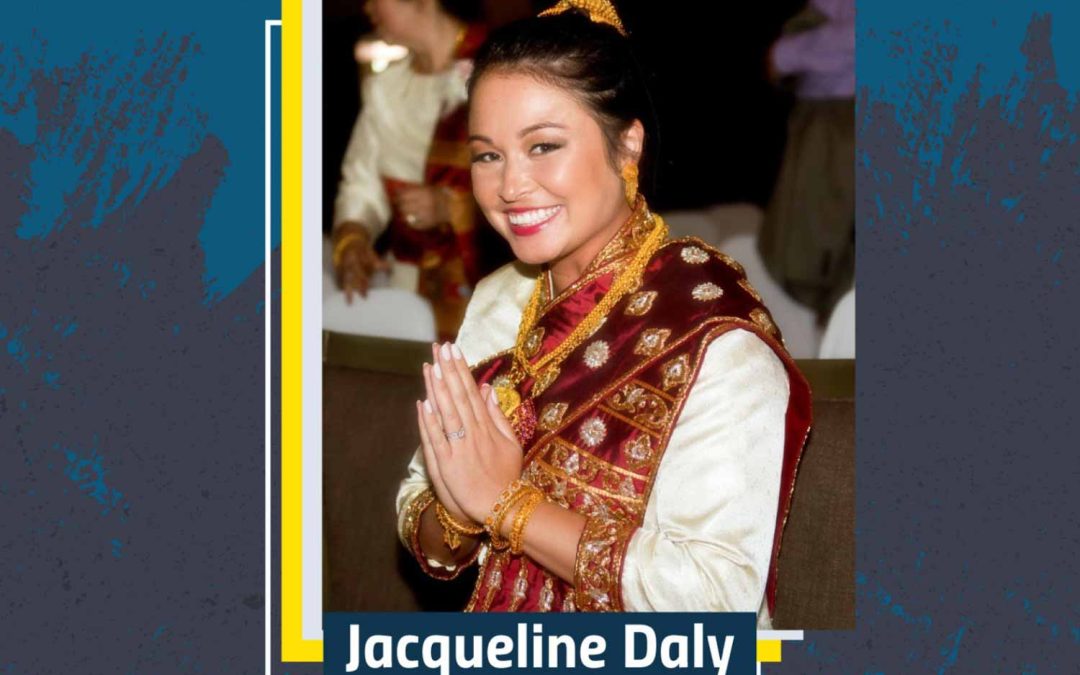
AAPI Heritage Month: Interview with Jacqueline Daly
To me, AAPI Heritage Month is a great time to reflect and celebrate my Asian heritage and all the family traditions that have made my life so culturally rich. I am very proud to be an Asian American. I think this is a great opportunity for communities to come together and learn about our diverse stories through a more inclusive lens.
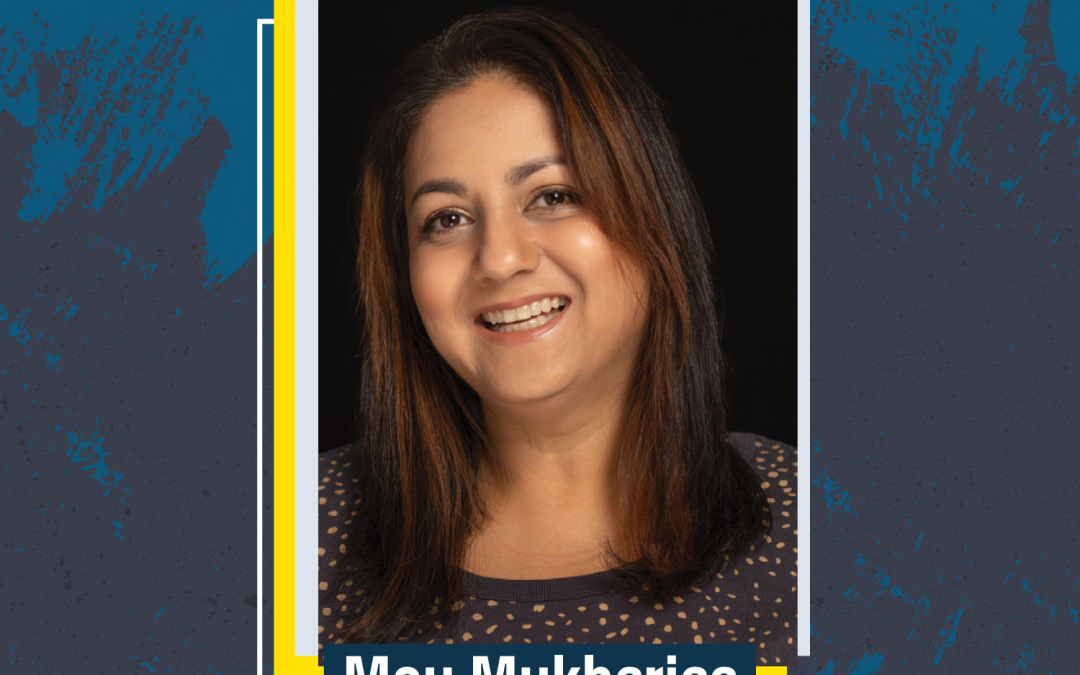
AAPI Heritage Month: Interview with Mou Mukherjee
In some ways, I abandoned my culture when I was young because I was trying so hard to fit in. My parents were, and still is very cultural. Growing up, there was always Indian music playing, our house was full of Bengali literature, my Dad’s hero was poet Rabindranath Tagore, and he also loved the films of Satyajit Ray. I was surrounded by culture and yet I couldn’t fully embrace it at the time.
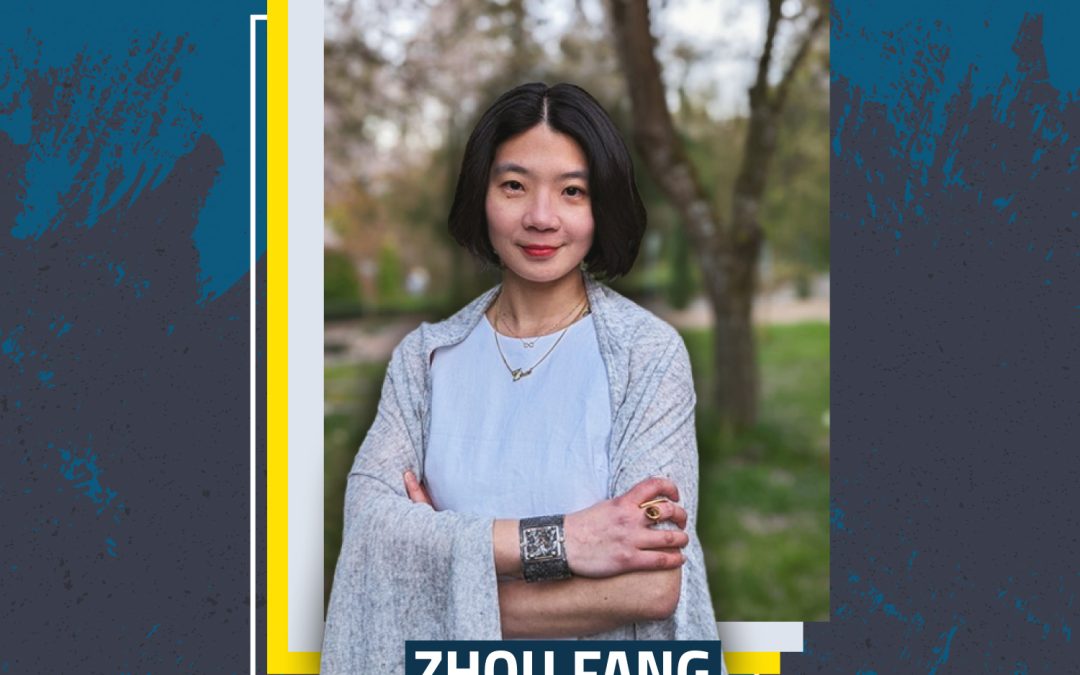
AAPI Heritage Month: Interview with Zhou Fang
I am an immigrant from Guilin, China. In 2010, I moved to the U.S. for grad school. After graduating from Kansas State University (Go Cats!) I moved to Oregon and have been living in Portland for the last 9 years.

Mid-Autumn Festival 中秋节快乐
中秋节与春节丶清明节丶端午节并称为中国四大传统节日。受中华文化的影响,中秋节也是东亚和东南亚一些国家尤其是当地的华人华侨的传统节日。 中秋节,农历八月十五,又称仲秋节丶拜月节丶女儿节或团圆节,是中国的传统文化节日,因其恰值三秋之半,故名中秋。中秋节始於唐朝初年,盛行於宋朝,至明清时,已成为与春节齐名的中国主要节日之一。 2006年5月20日,中国国务院在中央政府门户网上发出通知,批准文化部确定并公布中秋节例在第一批国家级非物质文化遗产名录。自2008年起中秋节被列为国家法定节假日。...
